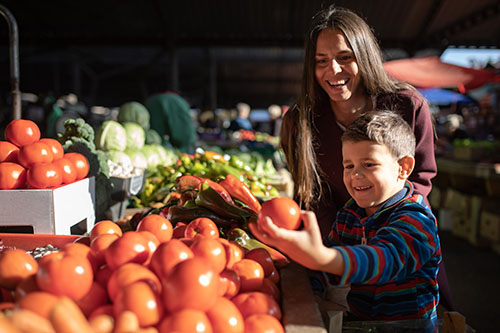The Benefits of Farm Fresh
Mar 21, 2022

Due to both supply and health concerns, buying locally-grown food has become a bigger priority for many consumers over the past couple of years. In fact, 85% of respondents in a Forager survey said that they would switch grocers if it meant having access to more local, fresh food. Grocery stores are not the only place to buy produce, though; there are numerous farmers’ markets, roadside farm stands, and pick-your-own farms throughout the state offering fresh fruits and vegetables.
So, what’s all the fuss about “farm fresh”? The produce you buy from the grocery store generally contains lesser nutritional value than food that is locally grown. The food at grocery stores must be preserved for much longer periods to make the trip to the store and withstand shelf life without rotting. Because of this, produce is often harvested before it is fully ripe, which means less nutritional content. The nutritional value can continue to decline during transport when the produce is exposed to air, artificial lights, temperature changes, and chemicals.
On the other hand, locally grown food is often picked at peak ripeness since it does not have to be preserved for long-distance transport. When fruits and vegetables are most ripe, they are most nutrient-dense. However, they will begin to lose their nutritional value within 24 hours of being picked, so the fresher the healthier.
Eating locally-grown produce also means that you know exactly where your food is coming from, and you may have the chance to meet the farmer who grew your food. You may even decide to grow your own produce. Farming practices focusing on sustainability and quality over quantity often result in better tasting, more nutritious produce. Don’t be scared to ask questions about farmers’ methods and pesticide use — many farmers welcome the chance to share their passion with others!
Whether you look for local foods at the grocer, buy from a farmers’ market, or grow your own produce from the garden, you will stand to benefit from the nutritional content and unmatched flavor of farm-fresh food! Your local Co-op offers expertise on all your farming and gardening needs. Don’t hesitate to stop by for spring planting advice and supplies.
For more content like this, check out the latest issue of the Cooperator.
So, what’s all the fuss about “farm fresh”? The produce you buy from the grocery store generally contains lesser nutritional value than food that is locally grown. The food at grocery stores must be preserved for much longer periods to make the trip to the store and withstand shelf life without rotting. Because of this, produce is often harvested before it is fully ripe, which means less nutritional content. The nutritional value can continue to decline during transport when the produce is exposed to air, artificial lights, temperature changes, and chemicals.
On the other hand, locally grown food is often picked at peak ripeness since it does not have to be preserved for long-distance transport. When fruits and vegetables are most ripe, they are most nutrient-dense. However, they will begin to lose their nutritional value within 24 hours of being picked, so the fresher the healthier.
Eating locally-grown produce also means that you know exactly where your food is coming from, and you may have the chance to meet the farmer who grew your food. You may even decide to grow your own produce. Farming practices focusing on sustainability and quality over quantity often result in better tasting, more nutritious produce. Don’t be scared to ask questions about farmers’ methods and pesticide use — many farmers welcome the chance to share their passion with others!
Whether you look for local foods at the grocer, buy from a farmers’ market, or grow your own produce from the garden, you will stand to benefit from the nutritional content and unmatched flavor of farm-fresh food! Your local Co-op offers expertise on all your farming and gardening needs. Don’t hesitate to stop by for spring planting advice and supplies.
For more content like this, check out the latest issue of the Cooperator.